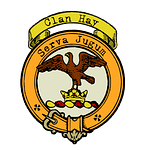Welcome back to A Clan A Day Podcast, brought to you by bagtownclans.com. I’m your host, Colin MacDonald, and today we’ll be diving into the deep history of Clan MacInnes. This West Highland clan has ancient roots that stretch back to the early days of Dalriada, with ties to the Irish kingdom and Scotland’s early Gaelic settlers. Known for their loyalty, fierce fighting spirit, and seafaring prowess, the MacInnes clan’s history is one of survival, alliances, and a proud connection to the Lords of the Isles.
The name MacInnes comes from the Gaelic "MacAonghuis," which translates to "son of Angus." Angus, one of the most ancient and revered Gaelic names, is tied to early Scottish history through the kingdom of Dalriada, where three brothers—Fergus, Loarn, and Oengus (Angus)—helped establish the foundation of Scotland. While much of Scottish lore remains shrouded in myth, it is believed that Angus, a master of ships and seafaring, laid the groundwork for the MacInnes clan in the Hebridean islands of Islay and Jura. His descendants, the Cinel Aonghais (Clan Angus), became known for their military might and maritime expertise, qualities that would later define the clan’s role in Scottish history.
By the 9th century, Viking invasions forced many of the MacInnes people from their ancestral homes in the islands to the mainland, where they settled in Morvern and Ardgour. Here, the MacInnes clan carved out a reputation for themselves as skilled warriors and strong allies. They became part of the Siol Gillebride, a confederation of clans that included the MacGillivrays, MacEacherns, and MacMasters. Together, these clans resisted Norse incursions and later became intertwined with the powerful Lords of the Isles, a relationship that would define much of their early history.
One of the most significant moments in MacInnes lore occurred during the early 12th century when the clan sought the help of Somerled, the legendary Norse-Gaelic warrior who would later become the progenitor of the MacDonald and MacDougall clans. Facing relentless Viking attacks, the MacInneses followed Somerled’s brilliant plan, which involved a clever deception using cowhides to make their army appear much larger. The Vikings, tricked into thinking they were outnumbered, fled, and many were slain. In gratitude, the MacInnes clan pledged their loyalty to Somerled and the Lords of the Isles.
The clan’s headquarters became Kinlochaline Castle, an imposing fortress located at the head of Loch Aline. According to tradition, this "Castle of Butter"—so named because the Lady Dubh Chal supposedly paid its builders with butter—became a symbol of MacInnes strength and resilience. Built on a high rock with sweeping views of the surrounding loch, the castle served as a strategic coastal defense, and its ruins still stand today as a reminder of the clan’s enduring presence in the region.
However, like many Scottish clans, the MacInneses faced internal and external challenges. Around 1358, tragedy struck when the MacInnes chief and his sons were murdered at Ardtornish Castle on the orders of the Lord of the Isles. The motive behind this act is unclear, though some suggest it was due to interference in a marriage. The aftermath saw the MacInnes clan lose much of their land, which was granted to the MacLeans in 1390. Despite this devastating blow, the clan survived, though they remain without a chief to this day.
By the 17th century, the MacInneses found themselves caught in the larger conflicts of the British Isles. During the Wars of Montrose in 1645, Kinlochaline Castle was besieged and eventually taken by Alasdair MacColla’s forces, but not before the MacInnes clan had made a valiant defense. Many members of the clan also fought in the Jacobite uprisings of the 18th century, with some supporting the Hanoverian cause under the protection of the Campbells, while others backed the Jacobite cause alongside the Stewarts of Ardshiel. In fact, Donald Livingstone, the son of Anna MacInnes, famously saved the Appin Banner from disgrace at Culloden, smuggling it away from the battlefield and ensuring its preservation—a testament to the clan’s courage and dedication.
The MacInnes clan also had a rich tradition of archery. Some members became hereditary bowmen to the chiefs of Clan MacKinnon on the Isle of Skye, where they passed on their expertise to future generations. These bowmen, known as Sliochd Neill a’ bhogha, or the "Line of Neil of the Bow," enjoyed a special place of honor within the MacKinnon clan, reflecting the MacInnes’s historical significance.
The Highland Clearances in the late 18th and early 19th centuries forced many MacInnes families to emigrate, particularly from Skye and Mull. Like so many other Highland clans, they were driven from their lands by economic pressures and the shift toward sheep farming. Despite these hardships, the MacInneses flourished in their new homes, particularly in Canada, the United States, and Australia, where they became prominent in business, politics, and the military.
Today, the legacy of Clan MacInnes is preserved through the International Association of Clan MacInnes, founded in 1970. The association works to maintain the clan’s rich heritage, supporting the restoration of historic sites such as Kiel Kirk in Lochaline and fostering a sense of community among MacInnes descendants around the world. Although the clan remains without a chief, their story of resilience and survival continues to inspire new generations.
Thank you for joining us on this exploration of Clan MacInnes’s history. Be sure to tune in tomorrow for another episode of A Clan A Day Podcast. I’m Colin MacDonald, and as always, Go n-éirí an bóthar leat.











